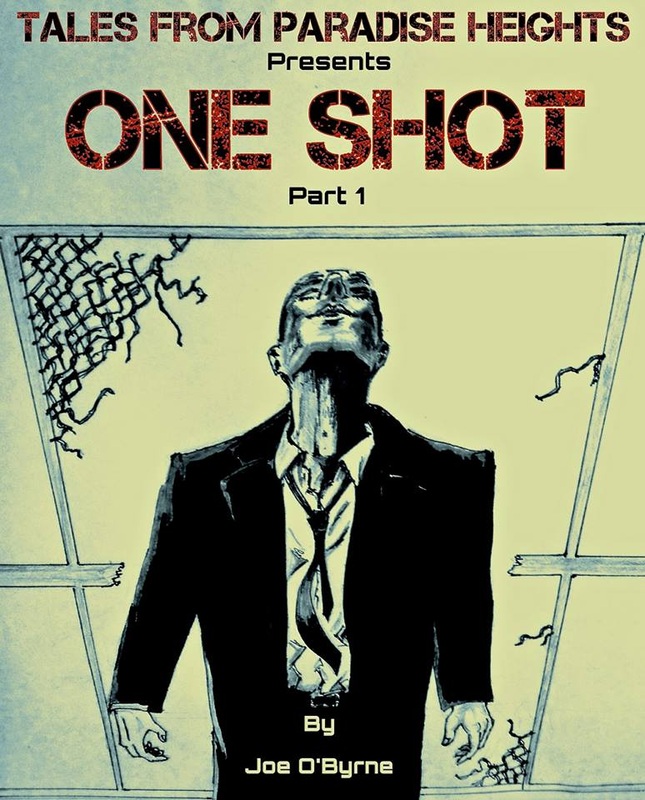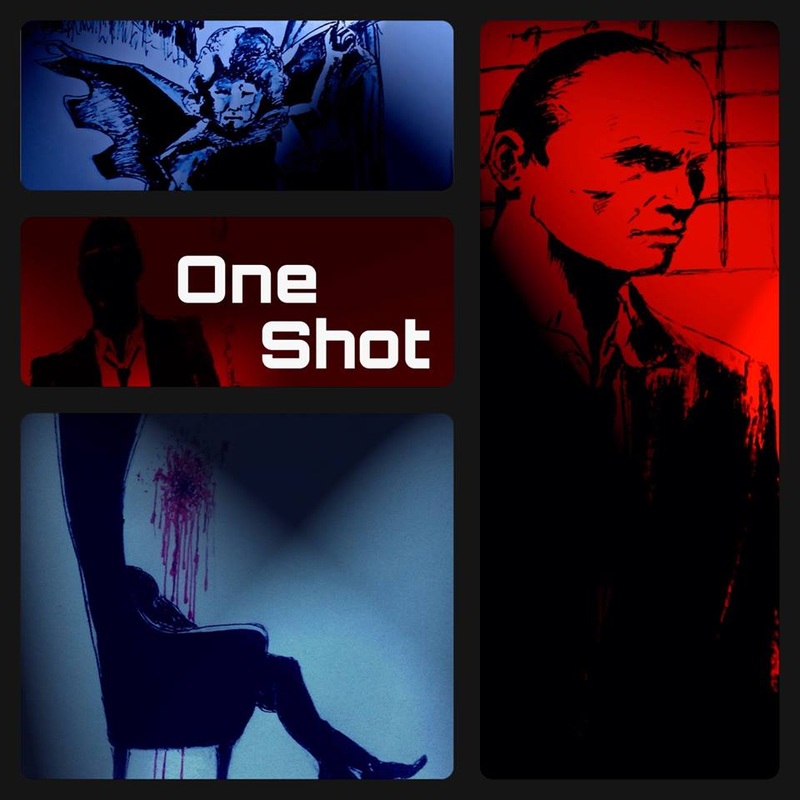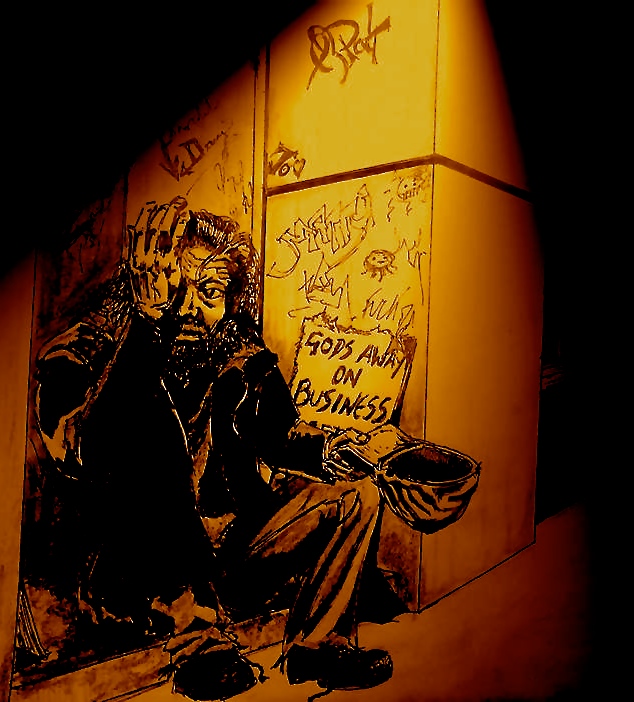'NOW DOES HE FEEL HIS SECRET MURDERS STICKING ON HIS HANDS....' ONE SHOT - A Tale from Paradise Heights: Chapter One
ONE SHOT, the latest instalment in Joe O’Byrne’s celebrated Paradise Heights cycle marks something of a new departure for him, albeit an entirely logical one. One of the things that has marked Joe’s approach from the first is a refusal to set limitations, to stick to one medium or one genre. Just as the various stories in the cycle blend social realism, noirish crime dramas, the supernatural, the metaphysical and the meta-fictional, so in addition to the core cycle of plays, there have been short films, a feature film, poems, short stories, songs, and performances which blend together some or all of these things, thus mirroring the manner in which the various narratives and characters cross over and cross reference one another, and creating a strong sense of an ongoing, fully-realised fictional world, beyond the confines of each individual Tale from the Heights.
ONE SHOT sees the world of Paradise Heights expanding again, establishing itself on yet another platform. O’Byrne has always claimed to have been influenced in his storytelling by graphic novels as much as by prose and plays and films and TV, and ONE SHOT marks his first experiment in working with the form. Intended as a prologue or prequel to the next play in the cycle, TORCH, it offers us a portrait of an increasingly unravelling and guilt-tormented Frank Morgan, the brutal crime lord who has a hand in everything bad going on in Paradise Heights.
The title is a play on words. The “One Shot” of the title refers to the one chance one has in life, and also in a more literal sense to a gunshot, the fall-out from which will upset the delicate balance of power in the Heights between the various crime bosses, and will wake up all of Frank Morgan’s buried demons. But a “One-Shot” is also the term used by comics publishers for an individual, one-off, self-contained issue of a particular title. This, O’Byrne seems to be telling us, is a “One-Shot”, too. A one-off experiment with a medium that he loves, and which has helped to shape his own creative imagination and storytelling voice. His creative process has been an unusual one, in that he has been sharing individual images via Facebook, calling for comments and suggestions, allowing friends, colleagues, admirers, the general public to watch the development of the piece as a work in progress. It’s a risky gambit. A first effort in a new medium, with every step in its evolution made public. But a courageous artist always takes risks. Joe O’Byrne is nothing if not courageous, and is never afraid to try new things.
At this stage, of course, I can only consider ONE SHOT as a work in progress. I cannot review it as a One-Shot graphic novel at all, but as “issue one” of a limited mini-series. I have no idea how many further “issues” there will be, nor how the story will develop - though I can hazard a guess based on my knowledge of the rest of the Paradise Heights cycle, and the mood of the piece thus far.
Does it work? Was the experiment worth the risk? Oh, hell, yes.
ONE SHOT is, as already stated, a piece focusing on Frank Morgan, and, it would seem, on the various ghosts and demons that stalk him. It’s a portrait of a violent, arrogant, bur increasingly tormented and isolated man; a man who dominates and looks down on the environment he inhabits; a king in his world, but one who increasingly fears for his crown. I am reminded of Frank Miller’s depiction of Wilson Fisk, The Kingpin, in his classic run on DAREDEVI, or Brian Azzarello’s portrayal of Lex Luthor - powerful men, with their fingers in every bad thing that makes money, who nevertheless cannot relax, cannot feel safe and secure, even for a moment, because they know their nemesis is out there waiting to destroy them. Morgan exists on a smaller scale, he dominates his environment, but is closer to it, too. He’s not really as far removed, as untouchable, as he’s always liked to think. There is no super-powered adversary to stand up to him, but there does not need to be. Like Richard III or Macbeth, his own guilty conscience is all the enemy he needs.
The tale is told in clipped, terse, expressive prose: hardboiled noir with a Salford accent. The stark, expressionistic art is a little crude in places, but bold and effective. Some of the layouts and storytelling techniques again recall the work of Frank Miller, but I am also reminded of Ho Che Anderson and in particular the early noir-tinged graphic novels of Brian Michael Bendis, back when he was still illustrating his own stories, rather than working with a separate artist. I always liked those early Bendis stories best. They are raw, pure storytelling, an unadulterated authorial voice, not filtered through the vision and interpretation of others, and thus have always seemed to me his most visceral, powerful, personal works. ONE SHOT thus far looks set to have many of the same qualities, which might be one reason O’Byrne opted to try his hand at the graphic novel form. Theatre and film are by their very nature collaborative art-forms, and over time, O’Byrne has surrounded himself with a loyal crew of talented creatives who have contributed much to the visualisation and realisation of his vision - indeed, there was a time when he was planning to collaborate with an artist on this project, or on one like it. But in the end he opted to go it alone. ONE SHOT is a one-off solo effort: Joe O’Byrne uncut and unfiltered.
And as you might expect, it’s strong stuff.
STEVE BALSHAW, as well as being a fountain of knowledge on graphic novels, runs the regular FILMONIK Film Events in Manchester, is the programmer for GRIMM FEST (GRIMM UP NORTH) and Salford Film Festivals, and is a regular actor and writer on the Manchester film scene.
All artwork by Joe O'Byrne



 RSS Feed
RSS Feed
